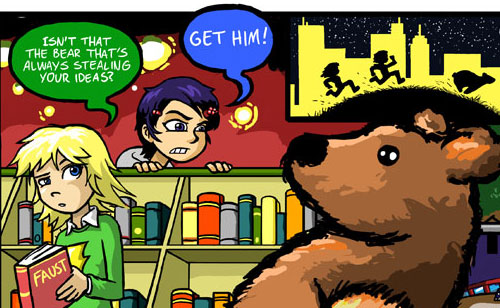(Originally sent December 2008)
The ‘Things’ email has existed in one form or another for over a year now. The fact that this is number 36 and not 52 shows that I clearly take too many Fridays off. (Actually it was mainly due to a big hiatus). Anyway, I have this Friday off, but have decided that that is not a good enough excuse.
Owing to the popularity of the chicken video last week and the sort-of anniversary of Things and the approaching of Christmas and the addition of more people to the list over the year, I thought it might be an idea to have a ‘Best of Things’ roundup next week.
So please reply and nominate your favourite items that have ever appeared in Things, and I will use these to compile a top 5, or something. I guess the people that just joined in the most recent wave don’t really have enough to go on, sorry! [Note, not a live question, this was sent in December 2008! – T.M. 22/1/11]
Quote
Roy Amara:
We tend to overestimate the effect of a technology in the short run and underestimate the effect in the long run.”
Link
Wondermark is a webcomic that is also a really great example of the value of copyright expiry. David Malki takes images from the 1800s (sourced from the public domain or his own collection of rare books), does a bit of photoshop and then adds speech bubbles.
He’s actually not bad at drawing either, but his writing is really very good, and this enables him to focus on that.
My personal favourite strip is a great example of how he makes humour out of philosophy:
http://wondermark.com/413/
My favourite sequence consists of four strips about getting rich, or not, which begins here:
http://wondermark.com/383/
A good example of his skill as a writer can be found in the following strip, in which there is a well-argued, thoughtful and erudite argument against the advertising for Shrek the Third, in about 60 words:
http://wondermark.com/298/
Puzzle
Last week we wondered why a chicken holds it’s head so still. A bit of Googling didn’t prove it immediately, but I am pretty confident that the reason is this: their vision, or processing of vision, is either movement-based or strongly prioritises movement. A bit like the dinosaurs in Jurassic Park.
This week a bit of estimation for you. In the UK, are there more households with dogs, or more with cats?
A Video (or two)
This video was brought to my attention by Richard. Alan Watts was a dude who knew what he was talking about, and said some wise things. The South Park guys did some animations that went with those things. Here is my favourite:
For you cat/Roomba fans, here’s another video of a cat riding a Roomba – this time the Roomba is behaving normally rather than being remote controlled. It gets a bit repetitive but do skip to the end if you get bored, as Something Happens:
Picture
A shrewd linguistic analysis of laughter:
Not really a picture I suppose, but best expressed as one.




